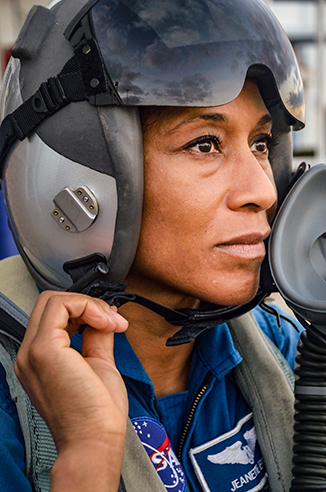Celebrating Black Engineers: Jeanette Epps
In celebration of Black History Month, the Department of Aerospace Engineering is highlighting some of our talented and diverse alumni through a series of stories sharing their journeys and advice for aspiring aerospace engineers. An engineer and now a NASA astronaut, Dr. Jeanette Epps (M.S. ’94, Ph.D. ’00) worked at the Ford Motor Company’s Scientific Research Laboratory after finishing up her doctoral studies at the University of Maryland (UMD). At Ford, she identified ways to use smart materials for safety devices and vibration reduction in vehicles. Just over two years later, she accepted an offer to work at the Central Intelligence Agency as an analyst and as a technical operations officer. But Epps had even higher aspirations–literally. Around 2008, she applied to the astronaut corps and was accepted a year later. She completed all candidacy training in 2011–a process that included certification in conducting a spacewalk, robotics, flying in the rear cockpit of a T-38 jet trainer, and studying Russian. During the analog missions she participated in while waiting for a spaceflight, she lived underwater for more than a week, becoming an aquanaut, and also spent five days in a cave. Currently, Epps is scheduled to fly to the International Space Station in about a year on one of the commercial crew vehicles, SpaceX or Boeing. Where/how did you get started on your aerospace engineering journey? I got started via a suggestion from my older brother. For undergrad, I majored in physics but found my way back to the idea of aerospace engineering. Who/what inspires you? One of my favorite things is to tell students about the work that is done at NASA. I love seeing their excitement about the work. It inspires me to work hard to make opportunities for them and it reminds me to be grateful. What has helped you succeed in your Aero journey? At UMD, Dr. Chopra, Dr. Wereley, and President Pines have helped me succeed in my 23-year career. My family were very supportive as well. What advice would you offer current students? I have several things that I would like to offer as advice: 1) Be a lifelong learner; 2) Determine your purpose and values; 3) Align your aerospace career with your purpose and values; 4) Be intentional in all aspects of your life. What have been some of your greatest personal/professional successes? My greatest successes have been to successfully work as an aerospace engineer for the past 20+ years. My success includes working not just technically in the field but also operationally. On a personal level, I have successfully balanced my personal life and work. I have reached a place where I am happy with work and my personal life.
Related Articles: February 16, 2023 Prev Next |


